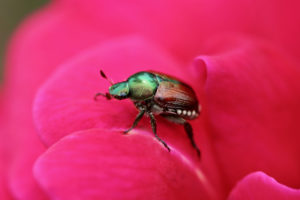
VIRGINIA BEACH — Sweet summertime brings beautiful flowers, homegrown vegetables and warm evenings on the patio sipping iced tea and admiring the lawn and garden.
And Japanese beetles, mosquitoes and plant diseases.
Yeah, summer isn’t all sweetness and sunshine.
Sometimes pests invade our plants or ourselves, and a few, like ants, can even find their way into the house.
I’ve already encountered my share of these pests this year. I’d be surprised if there were many locals who haven’t.
The good news is that there are some simple remedies that you can try.
So, here are just a few of these problems and some potential solutions:
Ants: They do have a way of getting into the house, and it can be very hard to get rid of them. Still, I’ve found that ants, like most pests, abhor hot peppers, so applying a very fine line of chili powder or dried hot peppers across your doorway will deter them.
Be sure that the line is solid, though, because the tiniest little break in that line is large enough for an ant to get through. I can almost promise you that they will find it.
Powder or peppers also discourage some mammals, including rodents and rabbits, that like to munch our plants, but if you apply the powder or peppers outside, you will need to reapply every time it rains.
Mosquitoes: If there’s anything more unwelcome than ants in your house, it’s probably mosquitoes in your garden or on your patio. These pesky little insects can ruin those lovely summer evenings on the patio, and after a heavy rain they can turn garden chores into torture sessions.
Just as ants hate chili powder, though, mosquitoes hate some plants, including citronella, lemon grass, mountain mint and lavender.
Planting these in your garden and in containers on your patio will help deter them, and you can also use them to concoct your own insect repellant by infusing them in a container of alcohol or vodka.

Over the years, I’ve tried various remedies, including traps and homemade repellants of vegetable oil, baking soda, water and mint, but this year none of that seemed to work.
So I’ve resorted to the tried-and-true method of plucking them from the plants each morning and dropping them into a bucket of soapy water. It’s an odious task, but it’s worth it to save the savory basil that I love in pasta sauces.
Downy mildew: Speaking of basil, I’ve had another problem with my sweet basil this season. I noticed that some of the leaves were turning brown and withering, which are likely to be symptoms of downy mildew. I suspect I caused the problem by careless, overhead watering.
I was dismayed to learn from the Virginia Cooperative Extension that downy mildew is difficult to control.
Still, while I lost a couple of plants, I did manage to salvage most of them by plucking off the affected leaves and removing any fallen leaves from the soil around the plants. I also learned that, while many cultivars of sweet basil are susceptible, some newer cultivars – including elenora, devotion, obsession, and thunderstruck – are more resistant, as are lemon basil, Thai basil and the red basils. It also helps to space the plants far apart so that air can circulate around them because downy mildew thrives in high humidity.
Common pests can be hard to control, but there are some simple things that can mitigate them. I can’t promise that they always work, but these approaches are inexpensive, environmentally friendly and worth a try.
For more information about downy mildew and other plant diseases, visit ext.vt.edu/lawn-garden/home-vegetables online.
The author is a contributor to The Independent News. Her journalism has also appeared in The Virginian-Pilot.
© 2021 Pungo Publishing Co., LLC

